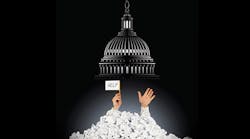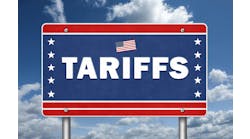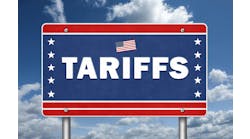The inescapable rise in supply chain costs is top of mind for material handling and logistics professionals these days. Much of it is attributed to such factors as congestion, lack of sufficient infrastructure investment, capacity constraints and shortages of trained professionals like truck drivers and air freight pilots. Another frequently cited culprit is the explosive growth in government regulations in recent years, much of which directly targets employers.
Regulation is nothing new for the material handling and logistics industry, of course. The first federal regulatory agency, the Interstate Commerce Commission, was created in the late 19th Century to regulate freight railroads. Since President Obama took office, however, labor and employment regulation burgeoned in a way never seen before.
Why did this happen? It can be traced directly back to the 2008 national elections, when unions poured more than $200 million into Democratic Party and Obama campaign coffers. In 2009, when Democrats controlled both houses of Congress and the White House, unions believed it would be a slam dunk to achieve the top item on their agenda: card check legislation.
Card check—where employees sign authorization cards stating they want a union instead of participating in a secret ballot vote—allows pro-union employees and union organizers to pressure individual workers into publicly signing the cards. Even some Democrat legislators balked at violating the principle of the secret ballot and card check failed to pass in Congress. As you can well imagine, that made unhappy the very union leaders whose support Democrats needed in future elections.
The Obama Administration sought to solve this problem by securing every advantage possible for the unions by using administrative actions to give them everything else on their agenda. The result was a raft of highly-partisan appointments to regulatory agencies, which then began rolling out policies and rules designed to favor unions.
How well did it work? With the exception of government employees, union membership in this country had been in decline prior to 2013. Then in the following year private sector union membership began to rise. In the first six months of 2014 unions participated in more representation elections and won a larger percentage of those elections than in the same period in 2013. (However, overall union membership remains near the historic 97-year low it hit in 2012, measuring a total of 11.3% of the workforce, down dramatically from its high point of 34.8% in 1954).
NLRB Approves Ambush Union Elections
Taking the lead in helping improve unions' prospects was the National Labor Relations Board, previously viewed as a neutral referee between union and management but now an unabashed advocate for organized labor. The board also used its mandate to protect employees' concerted activities involving wages and working conditions as a springboard for extending its reach to regulating nonunion employers' social media and employee arbitration policies, as well as telling companies how to write their employee manuals.
The NLRB has pressed this agenda through policy statements and rulemaking by the five-member board, policy guidances issued by its general counsel in Washington, and decisions made by its regional directors throughout the country.
One of the most important of these to employers is the recent final rule allowing "ambush" or "quickie" union organizing elections. Previously, disputes over issues such as whether certain employees should or should not be included in a union representation unit would be considered by the NLRB before the employees voted. Now these issues will be considered only after the vote occurs, and the board's decision about whether it will hear employer challenges is now considered discretionary instead of being mandatory, which it was previously.
Most importantly, the new rule ends the previous 25-day gap that began when an organizing election was scheduled and extended to when the vote occurred, shrinking it to as little as few as 10 days. This gives employers next to no time to put together a campaign for persuading employees to vote against the union. Typically, employers require expert advice at every turn of an organizing campaign—a few wrong words here and there and the board could order another election even if the union loses the vote.
At the same time, the NLRB also issued a decision that grants unions unfettered access to the employers' lists of employee e-mail addresses and phone numbers for organizing purposes, and for individual employees to use in voicing complaints about wages and working conditions.
A New Definition for Micro Unions
Related to these NLRB actions is the Department of Labor's "persuader" proposal, which is slated to be released as a final rule in March. Under current law, employers must report to the DOL each time they engage a consultant, who then tries to persuade employees directly or indirectly about organizing or collectively bargaining.
The exception to this, written into the law, is advice given to employers by lawyers or others who have no direct contact with the employees. The Labor Department proposes eliminating this exception, but the American Bar Association and the Association of Corporate Counsel have cried foul, asserting this would violate attorney-client confidentiality.
Also, look for further refinements in how the NLRB chooses to define "micro unions." In 2011 the board decided that subsets of employees called micro units can organize within a single operation. In a warehouse, for example, this could be just the forklift drivers or maintenance personnel in a particular location.
So far only three such micro union organizing cases have reached the board, all involving salespeople at large retail stores. It allowed the micro units to be recognized in two cases but not in the third, a thin record that makes it difficult for employers to fully ascertain the board's thinking about what it regards as a legitimate micro union.
NLRB actions also could impact your local fast food outlet. Last July NLRB general counsel Richard F. Griffin, Jr., a former NLRB board member and ex-general counsel for the International Union of Operating Engineers, announced that McDonald's could be treated as a joint employer of its franchisees' workers and shares liability regarding wage and other labor violations. McDonald's is contesting that determination, which has drawn widespread opposition because it could destroy the franchise model—an outcome much desired by unions and trial lawyers seeking additional corporate deep pockets for sexual harassment and other claims.
In the future, look for Griffin to continue pressing for findings of joint employer status in other franchise operations when those cases reach his desk.
OSHA Looks More Closely at Temps
Another joint employer determination closer to home for the material handling and logistics industry was OSHA's decision that companies that engage temp staffing firms are directly responsible for those workers' safety training and supervision. The agency mounted a major effort targeting this sector called the Temporary Worker Initiative, which it promises to vigorously pursue in 2015.
And it means business. OSHA inspections involving temp agencies increased 322% in fiscal year 2014. By late last year the agency had conducted 283 worksite inspections involving temps, compared to just 67 in 2013 and only 29 in 2012.
Expect OSHA to keep up this pace in spite of the fact that this year's round of inspections found violations only 15% of the time, resulting in a grand total of 83 citations.
Last year OSHA also delineated recordkeeping responsibilities for temp agencies and host companies. In most cases, the agency expects the Form 300 illness and injury log be completed by the host employer if an injury or illness occurs to a temp worker.
In 2014 OSHA and the American Staffing Association signed an alliance agreement pledging to work together to improve working conditions for temp workers, including joint development of training resources and disseminating information about workers' rights and employer responsibilities.
Also expected to be issued in 2015 by OSHA is the final version of a rule proposal that would require some companies to file their injury reports electronically. Currently, all employers with 11 or more employees are required to keep and maintain injury logs, but the proposal would require employers with more than 250 employees to file their reports electronically on a quarterly basis with OSHA, which would then post them on the Internet for everyone to see.
Many employers oppose the proposed rule, concerned that injury reports could be exploited by union organizers and tort lawyers. After hearing this concern from employers testifying at public hearings, OSHA acted swiftly in response—by adding to the proposal a provision penalizing employers who discourage employees from filing incident reports. The agency plans to issue a final decision in August.
Perhaps the most active and controversial of the federal agencies bedeviling employers is the U.S. Equal Employment Opportunity Commission. Once concerned primarily with racial, ethnic and religious discrimination, it has expanded its mission to include such things as extending the Americans with Disability Act (ADA) protection to pregnant workers and attacking company wellness programs for employees that the agency views as coercive.
The EEOC has sued several companies over their wellness programs and in February intends to issue a proposed rule to address financial inducements and penalties that are part of many programs employers offer through their health plans.
One area of great concern for employers is the EEOC's aggressive pursuit of "ban the box" litigation targeting criminal record and credit background checks of job applicants. The results the commission has achieved have been extremely mixed, to say the least. In some cases the EEOC racked up impressive settlements from companies in the tens of millions of dollars, but in others it has been rebuffed and harshly criticized by courts—including one case where the commission was ordered to pay the defendant company more than $750,000 in attorneys' fees and costs.
A Blizzard of Executive Orders
Of course, much more has been happening at the federal level than we can touch on here. If you are not a federal government contractor, ask one you know what it's been like dealing with the paperwork and other administrative burdens created by Obama's blizzard of executive orders imposing on federal contractors a raft of new requirements, from an increased minimum wage to protections for LGBT employees. If you are one of those federal contractors, you know exactly what I'm talking about.
This account also has left out what is happening at the state and local levels. Democrats in control of local and state governments around the country sought to shore up their positions at the polls last November (without much positive effect, it seems) by raising minimum wages, imposing mandatory sick leave, legalizing and decriminalizing marijuana, and attacking independent contractor status.
If you operate in a state where the legislature and several cities have created separate minimum wage and mandatory sick leave schemes, you now have a new and growing administrative challenge just trying to manage your payroll system.
And then there is California, where the proliferating welter of state and local laws governing employers is growing so rapidly and has become so byzantine that the state may be fairly described as a country within a country for employers because of its regulatory scheme.
The best advice: Try to keep up with the news about the changes in all of these areas, and seek out top-flight legal advice about your company's policies dealing with personnel and labor management issues to avoid making mistakes in a new world where even a small, inadvertent misstep can cost you—a lot.
David Sparkman is founding editor of ACWI Advance (www.acwi.org), the newsletter of the American Chain of Warehouses Inc. He also heads David Sparkman Consulting, a Washington, D.C., area public relations and communications firm. Prior to these he was director of industry relations for the International Warehouse Logistics Association. Sparkman is also a freelance writer, specializing in logistics and freight transportation, as well as a member of the MH&L Editorial Advisory Board.





